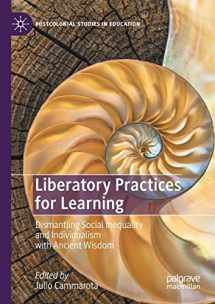
Liberatory Practices for Learning: Dismantling Social Inequality and Individualism with Ancient Wisdom (Postcolonial Studies in Education)
Book details
Summary
Description
Review
“The contributors to this volume are high school students, graduate students, former classroom teachers, and new and seasoned scholars who offer a powerful collection of liberatory practices that are grounded in cooperation, collaboration, and collectivity. It’s a must-read for those interested in disrupting neo-liberal education and reimagining pedagogies that are simultaneously grounded in ancient wisdoms and in new ways of existing with each other.”
―Dolores Delgado Bernal, Department Chair and Professor, Department of Chicana(o) and Latina(o) Studies, California State University, Los Angeles, USA
“I am thankful for Cammarota's explicit challenge to the lies of liberalism, merit, and white supremacy. His offerings on education for liberation are reflective of a collective process that has been purposely stolen from us. In our reclamation, he reminds us of the necessity and duty to return to what we've already known.”
―David Stovall, Professor of African-American Studies and Criminology, Law, and Justice at the University of Illinois at Chicago, USA
This book promotes collaborative ways of knowing and group accountability in learning processes to counteract the damaging effects of neoliberal individualism prevalent in educational systems today. These neoliberalist hierarchies imposed through traditional, autocratic knowledge systems have driven much of the United States’ educational policies and reforms, including STEM, high stakes testing, individual-based accountability, hierarchical grading systems, and ability grouping tracks. The net effect of such policies and reforms is an education system that perpetuates social inequalities linked with race, class, gender, and sexuality. Instead, the author suggests that accountability pushes past individualism in education by highlighting democratic methods to produce a collective good as opposed to a narrow personal success. In this democratic model, participants contribute to the common goal of elevating the entire group. Drawing from a well of creative praxes, reflexivity, and spiritual engagement, contributors incorporate collective dreaming to envision alternate realities of learning and schooling and summon the spirit into action for change.
From the Back Cover
This book promotes collaborative ways of knowing and group accountability in learning processes to counteract the damaging effects of neoliberal individualism prevalent in educational systems today. These neoliberalist hierarchies imposed through traditional, autocratic knowledge systems have driven much of the United States’ educational policies and reforms, including STEM, high stakes testing, individual-based accountability, hierarchical grading systems, and ability grouping tracks. The net effect of such policies and reforms is an education system that perpetuates social inequalities linked with race, class, gender, and sexuality. Instead, the author suggests that accountability pushes past individualism in education by highlighting democratic methods to produce a collective good as opposed to a narrow personal success. In this democratic model, participants contribute to the common goal of elevating the entire group. Drawing from a well of creative praxes, reflexivity, and spiritual engagement, contributors incorporate collective dreaming to envision alternate realities of learning and schooling and summon the spirit into action for change.


We would LOVE it if you could help us and other readers by reviewing the book
Book review



